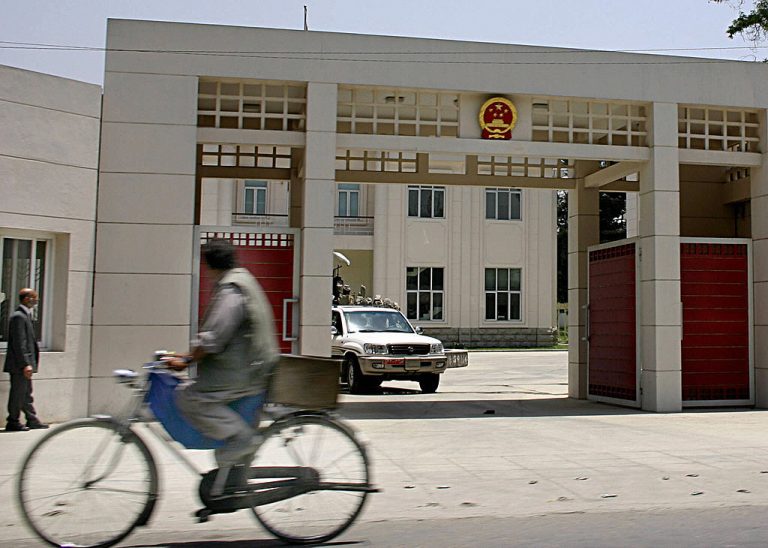Following China’s opportunistic moves on Afghanistan, Eurasia Group President Ian Bremmer stressed the negative consequences the U.S. withdrawal from the country could bring to Beijing’s plans.
China and the Taliban
As Afghanistan falls back into Taliban control, the Chinese Communist Party (CCP) has taken advantage of the crisis, calling it “a lesson in reckless military adventures.” The communist regime called for “friendly and cooperative relations with Afghanistan.”
“I think that China sees a propaganda opportunity, in rubbing America’s nose in the fact that there’s all these horrible videos coming out in Afghanistan and the Taliban sees that they’ve won,” Bremmer added. “But this is not a real opportunity for China, it’s a problem for China.”
According to Bremmer, the Taliban’s resurgence poses a threat to Beijing as a “deeply unstable and pretty radical government.”
The Party could possibly face the return of the Uyghur militant group, the East Turkestan Islamic Movement (ETIM). Following suicide bomber attacks that claimed the lives of Chinese nationals, China has expressed concerns about the security of its borders.
Success
You are now signed up for our newsletter
Success
Check your email to complete sign up
Chinese leader Xi Jinping’s Belt and Road Initiative (BRI) could also be disrupted by potential instability in the region, likely preventing the communist-ruled country from achieving success in Afghanistan.
Bremmer also cited China’s internal problems, which are already strained by their failed investments in Afghanistan through copper mines and other infrastructure projects.
‘Friendly relations’
According to CCP-run news outlet Xinhua, China has pledged to “respect the choices of the Afghan people and hopes for a smooth transition in the Afghan situation” following the US withdrawal, a Foreign Ministry spokesperson said.
As the US and several European countries left Afghanistan, China remained, with its embassy staff still operating in the country. Chinese State Councillor and Foreign Minister Wang Yi had met with Taliban chief Mullah Abdul Ghani Baradar in Tianjin on July 28.
“We hope the Taliban will unite with all parties and ethnic groups in Afghanistan to establish a broad and inclusive political structure that suits its own national conditions to lay the foundation for realizing a lasting peace in Afghanistan,” spokesperson Hua Chunying said.
Despite not recognizing the Taliban, the CCP opposed the sanctions on the group, citing “a failure of US policies.” The CCP claims to expect the Taliban to fully commit to the transition and prevent all violence and deaths of Afghan people.
It has also been reported that China could be attempting to seize rare metals found in mines in Afghanistan by cooperating with the Taliban, in order to add to its trade war arsenal.
Past collaborations
The CCP’s interests in Afghanistan can be traced back to the Soviet-Afghan war, supporting Afghan fighters against invading armies and widening the rift between China and the Soviet Union.
After the 9/11 attacks in 2001 against the US, allegedly orchestrated by the Taliban, China attempted to portray itself in a better light to mask its human rights violations against the Uyghur Muslim population.
However, the CCP’s attempts to gain US support against the Eastern Turkistan Islamic Movement (ETIM) following alleged attacks on Xinjiang failed to bear fruit.
“We knew the Chinese wanted to use [the crackdown on Xinjiang] as an excuse to go after all sorts of Uyghurs, which it was probably going to do anyways,” former assistant secretary of state for Central Asia Richard Boucher said. “Since 9/11, we’ve found terrorists under every mattress, but never found anyone serious with the Uyghurs.”
Following America’s delisting of the ETIM from the US Terrorist Exclusion List in 2020, the CCP accused the country of an “ugly two-faced approach” to counterterrorism.
Around 1999, China made a proxy out of Pakistan to coerce the Taliban into attacking Uyghur militants in Afghanistan, while also giving the terrorist organization incentives for safe flights and telecommunications improvements.
In 2000, China’s ambassador to Pakistan, Lu Shulin, met Afghanistan’s then-leader Mullah Omar, ensuring contact between Beijing and the Taliban. Chinese-manufactured weapons have even been reported to be within Taliban hands, right under American radars.















